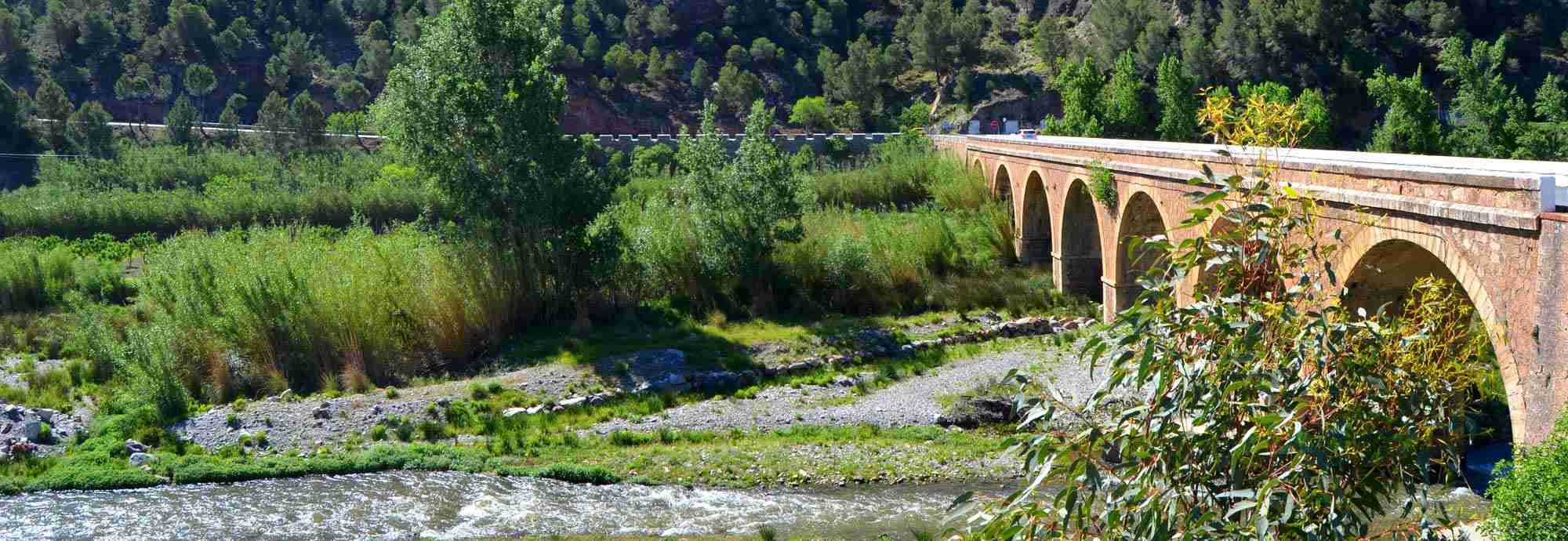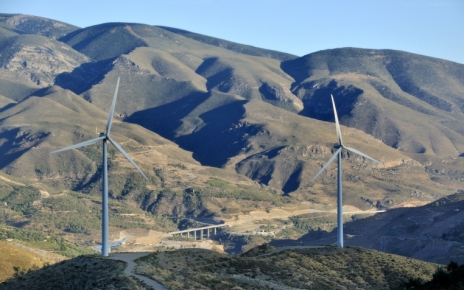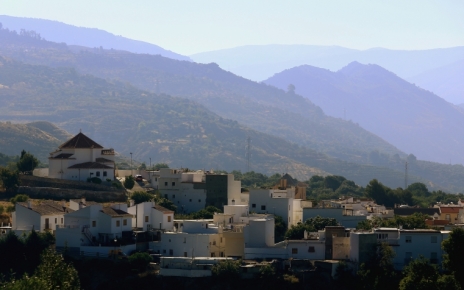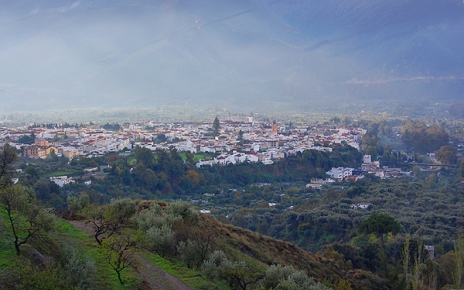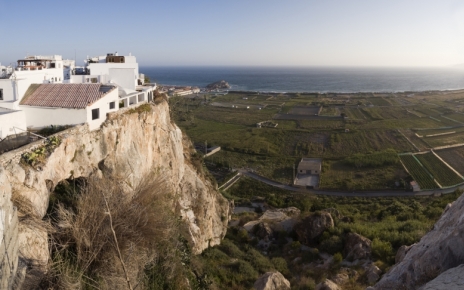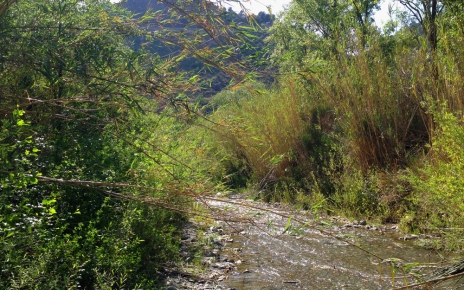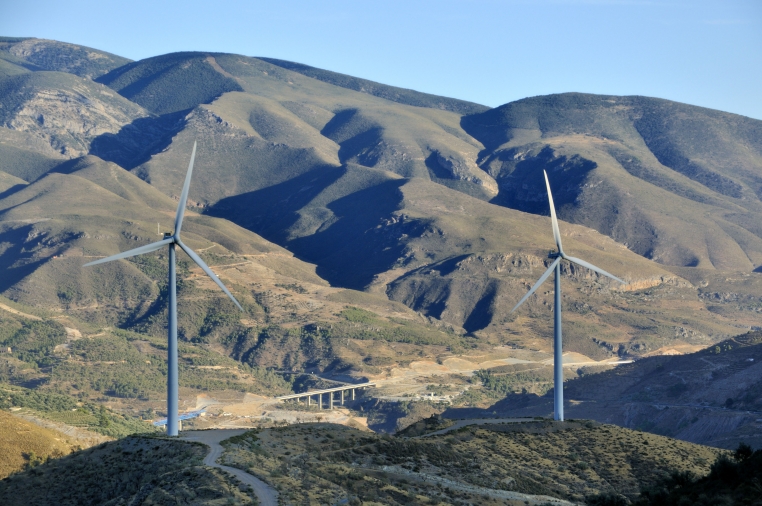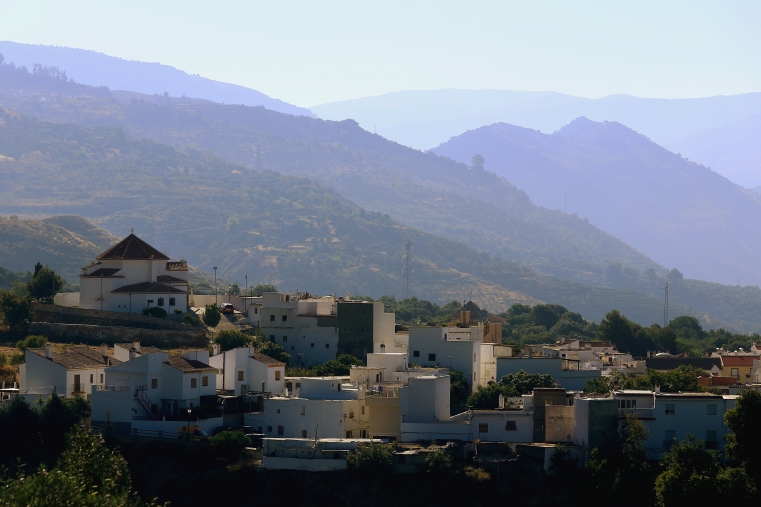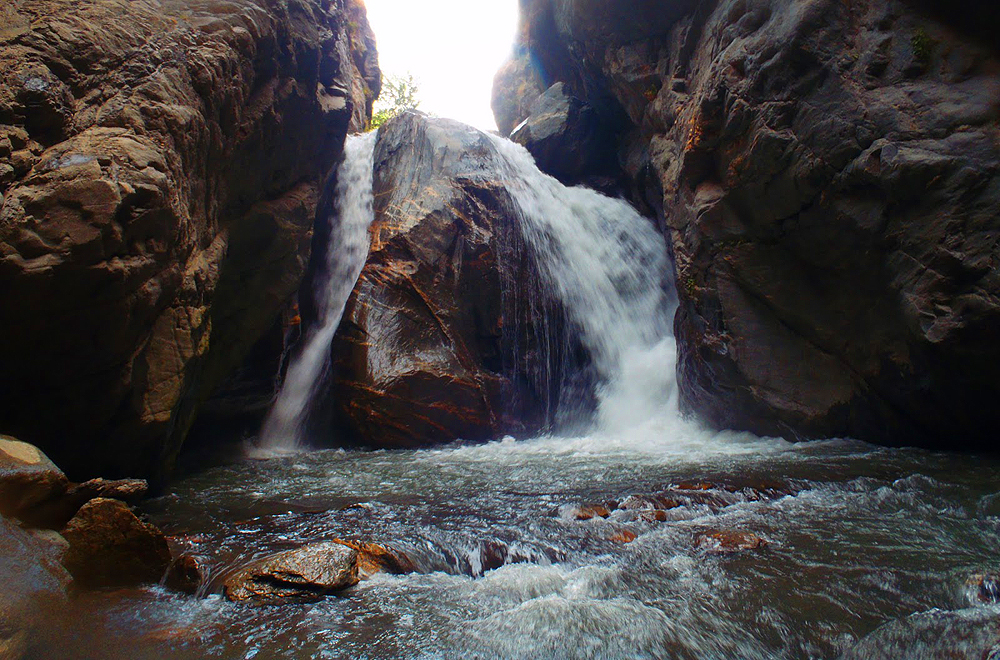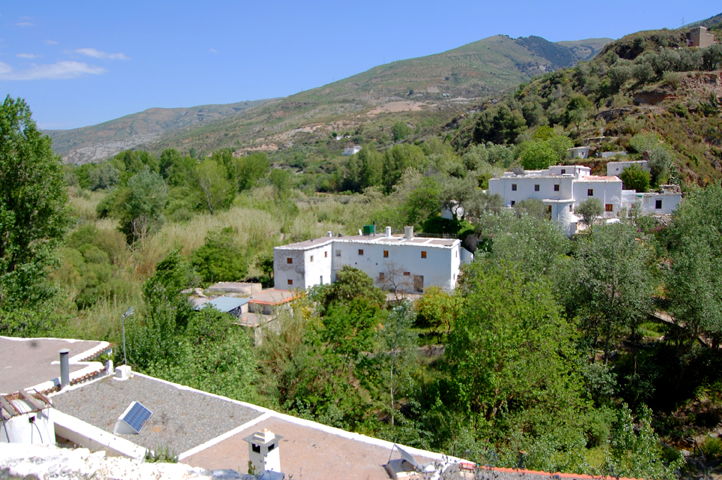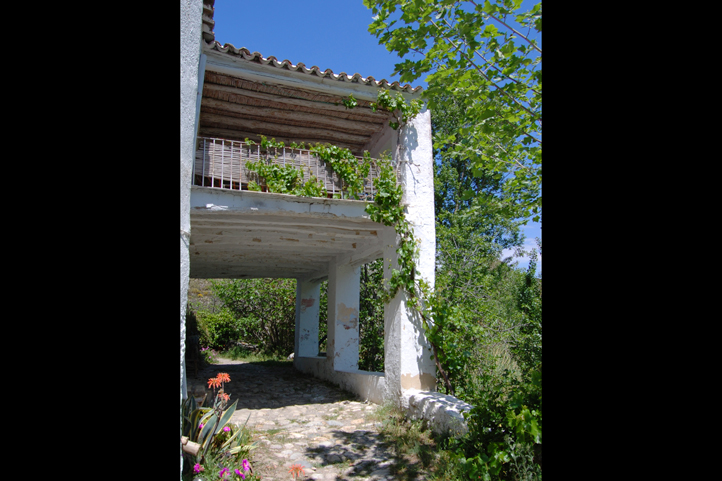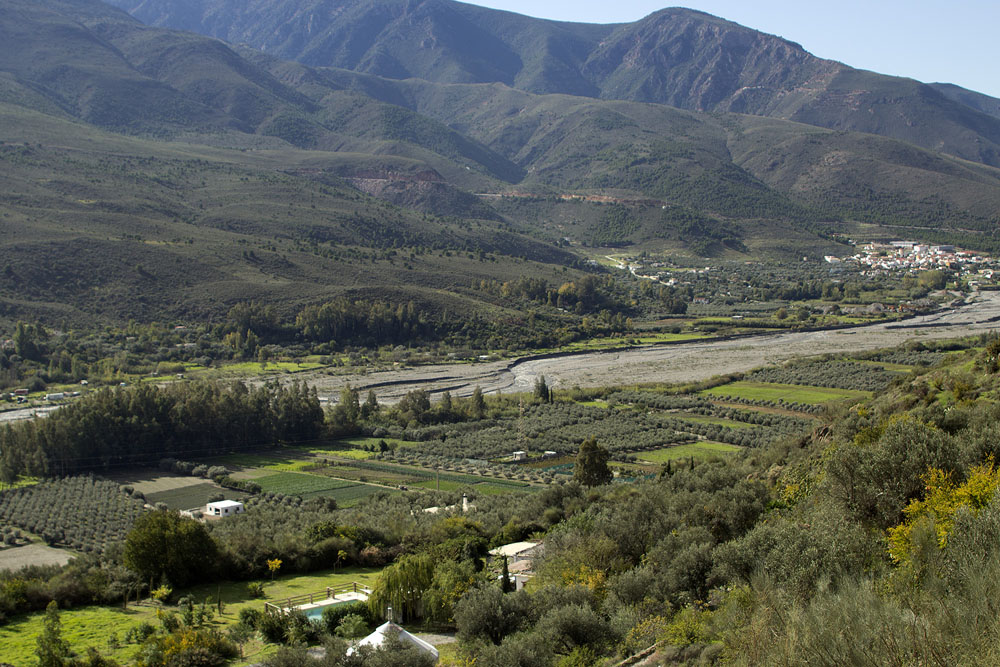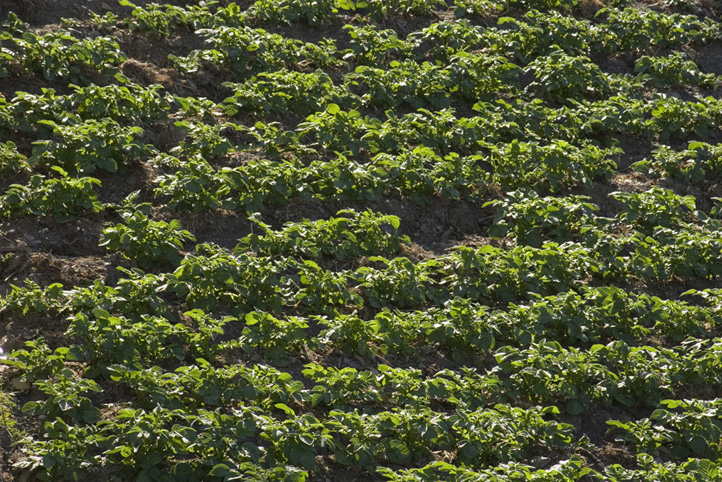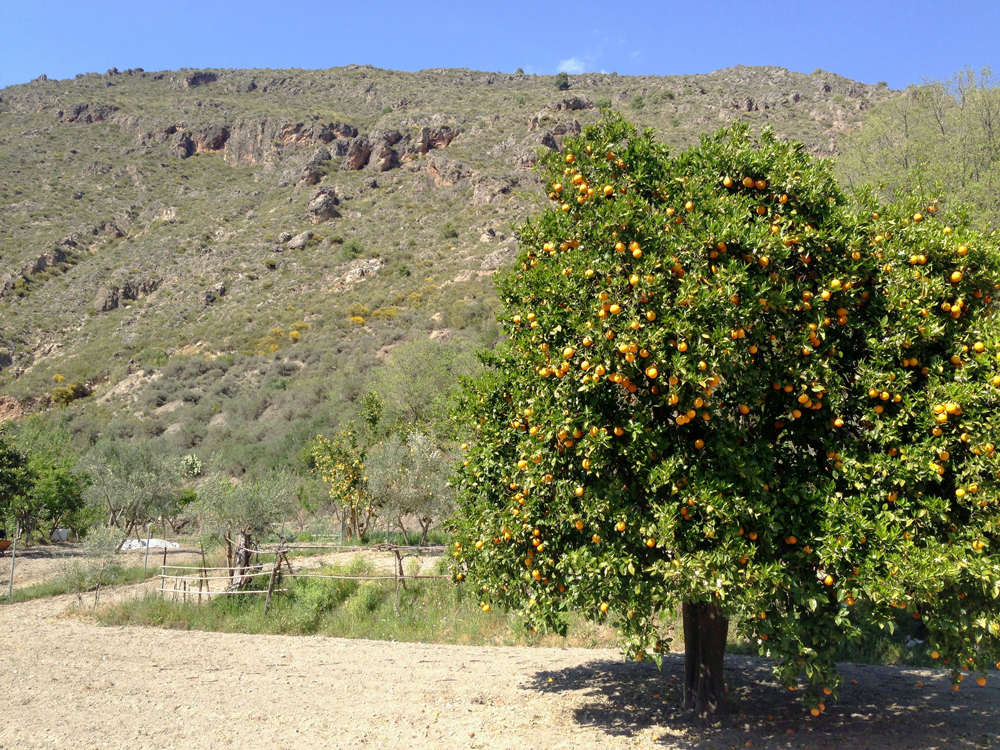The focal for the Low Alpujarra is set in the broad river valley of the River Gualdalfeo, where it enjoys a semi-tropical climate. You'll see orange and lemon trees, palm trees, avocado. Holiday villas are mostly located close to town, which has all the shopping and practical facilities you may need.
Although the privacy and peace-and-quiet of your holiday villa may be the main attraction, the town has a character all of its own and can surprise the causal stroller with scents of jasmine and honeysuckle, and colourful splashes of bougainvillea.
Orgiva has small supermarkets and a variety of shops, chemists and banks with ATMs.Orgiva high street is situated off the main road running though the town. Here you'll find the church, banks, tobacconist (estanco, which also sells stamps), camera shop, pharmacy and café-bars with terraces where you can sit out. A covered market continues the shops and cafés. The main health centre (centro de salud) for Las Alpujarras is near Orgiva town centre.
Thursday is market day, when the town swells with market sellers, local housewives and a mixed bag of foreign residents, from relocated stockbrokers to unconventional travellers: there's a place for everybody here.
LANJARÓN
The spa town is the first place you come to when after leaving the highway that runs between Granada and the Mediterranean coast. Lanjarón water is well-known internationally. Water is everywhere in Lanjarón and everyone has their favourite fountain. Some claim the water gives health and long life: whether or not the water is responsible or just the quiet life people lead here, a World Health Organization survey found that Lanjarón inhabitants enjoy one of highest life expectancies in Europe.
The town is built on the lower slope of the mountains, where holiday homes enjoy good views out over the Guadalfeo valley. The high street of the town is quiet thanks to a mini-bypass for traffic continuing to Orgiva. In the market area, on one typically Andalusian street the local women sell produce from the market gardens on their doorsteps.
Just outside Lanjarón, you will see the impressive ruins of a Moorish fortress on a promontory: a rare reminder of the special history of the Alpujarras.
Roads lead off in four interesting directions from Orgiva: to Granada and the Alhambra, to Costa Tropical beaches; up the valley, where a good country hotel restaurant is one of our favourites; and up the mountains to the villages and hiking paths of the High Alpujarra.
GRANADA
One of Spain's greatest historic small cities and the site of the magnificent Alhambra Palaces is around 40 minutes drive from the Low Alpujarra. The superlative Alhambra Palaces are reason enough on their own to visit the historic city. It's easy to drive directly to the Alhambra, taking the appropriate exit from the motorway and leaving the car in the car park. From there, you can also walk down to the Plaza Nueva and the city centre to visit the cathedral and explore the old Albaycín quarter on foot. Advance booking is advised for the Alhambra as the number of visitors per time slot is limited. You can print your tickets off at the 24-hour ATM of La Caixa bank in Orgiva.
There are also buses between Orgiva and Granada, although the service is limited (check buses from Orgiva to Granada at: Alsa.es). Main sites in Granada are in a compact area, making it easy to visit the Alhambra and wander the squares and the old neighbouthood of the Albaicin.
BEACHES
Granada's Costa Tropical is 40 minutes from the Low Alpujarra. Don't expect golden sands, but do enjoy fried fish on the beach and a great climate. In our Local Guide for Rustical Travel holidaymakers, we direct you to one of the more hidden-away coves near Calahonda, with clear water and a good chiringuito beach restaurant.
Salobreña, a small whitewashed town 3 km west of Motril with pebble beaches, is popular in August, so get down there fairly early. You can buy barbecued sardines on the beach itself and a number of restaurants, cafés, bars, ice cream kiosks, even a Chinese restaurant (quite good and air-conditioned) along the seafront.
Further along the Mediterranean coast towards Malaga, in the Maro area, there are natural beaches where access is more restricted. You may need to park at the top and walk down to the beach. You will find more than one beach between La Herradura and Nerja. We recommend Cantarriján beach (part naturist, part not).
VILLAGES OF THE HIGH ALPUJARRA
In half an hour you can be in another world altogether. The old mountain villages of Bubion, Capileira & La Tahá enjoy beautiful and dramatic settings below Sierra Nevada National Park.
Read more about High Alpujarras
High Alpujarra walks: Make the most of a day out in the High Alpujarra with at least a short walk. The hiking is superb. The healthy mountain air can work up an appetite that will then be amply catered to by well-priced village restaurants.
The most ambitious hike is up Mulhacén (3,482 m), the Iberian Peninsula's highest mountain. Although no rock climbing is involved, the ascent is often impassable in winter as snow can lie deep.
BEST OF THE REST
Puerto Juviley
Interesting as a village whose charm stems from its unchanging nature. Tall reeds and grasses grow up along the riverbank. The atmosphere is almost Mexican. It's about ten minutes from Órgiva, and reached along the road from Órgiva to Torvizcón.
Sierra Nevada National Park
Above the Low Alpujarra rise Sierra Lújar to the south and the great range of Sierra Nevada to the north. The Sierra Nevada National Park offers an utterly different aspect to the same geographic area, with a high altitude climate and terrain, and snow atop Mulhacén mountain.
Fiestas
On the eve of San Juan, 24th June, when the rest of Spain celebrates the saint with fire rituals, the people of Lanjarón cool off the hot night with a no-holds-barred water fight in which getting drenched is compulsory. Locals from other Alpujarra villages know better than to attempt to drive through Lanjarón that night!
Orgiva's main fiesta, the feria grande, is held the last week in September. It involves activities such as floats and photographic contests, costumes, bingo and games for children, and bands that keep people dancing all night.
Earlier in the year, a fortnight before Easter is Orgiva's fiesta of the Santísimo Cristo de la Expiración, a religious feast day and excuse for letting off a barrage of fireworks.
FOOD AND DRINK
Orgiva has two supermarkets on the road running through the town and others in the town centre. An English-run health food shop called Camac stocks items you won't find elsewhere.
On Thursday market day you can buy all manner of fruit and vegetables, as well as fresh herbs and spices from a wholefood stall. A van selling whole roast chickens always does a good trade. The indoor market has a stall selling fresh fish.
Local cuisine in the Low Alpujarra includes goat, almonds and figs in season. Migas is a filling dish based on fried crumbs. Otherwise, standard fare is varied by restaurants catering to the tastes of international residents and visitors.
Wines from the Low Alpujarra, especially the Sierra de la Contraviesa, have been improving over the years to acquire a definite respectability.
The free tapas often served at bars are often a generous substitute for a light meal.
• Café-Restaurante La Baraka - Your place for falafel, shwarma kebabs, Indian chai tea and ice creams. Healthy Moroccan food includes many tasty vegetarian options, dishes made with organic products. As this is a Muslim establishment, no beer or wine is offered. It's located right by Orgiva outdoor market and takes Friday off after a busy Thursday.
• Galindos café - Just up from the church is a good breakfast spot with excellent tostadas (toast) and coffee, also a variety of bread and pastries.
• El Molino - Is an attractive venue with its courtyard and good tapas.
• Almazara - Restaurant that offers Andalusian cuisine and pizzas in a traditional and relaxing setting. In summer, meals are also served in the restaurant's orange garden. Some evenings they play jazz and having dinner here is very pleasant and intimate despite being in the centre of town.
Standard fare is varied by restaurants catering to the tastes of international residents and visitors."
• La Flor del Limonero - Our top recommendation, at the countryside setting of Hotel Taray. Its lunchtime set meal (menú) varies and it's an excellent choice for a special meal out. Drive out of Orgiva towards Motril and it's on the left just before the Camping.
• Restaurante El Camping - At the campsite, it offers regular meals including good salads and a lunchtime menú indoors or out on its terrace. It's popular with families. Diners can ask to use the campsite swimming pool. On the left of the road out of town on the way to Motril, not far from the bridge.
• Venta El Puente - Simple and very authentic bar-restaurant, further down from the Camping, right by Orgiva bridge on the way to Motril. Meats are often grilled over burning embers and the atmosphere feels a couple of decades behind the busier centre of town.
Another half an hour along the same road will bring you to Cádiar and the Alquería de Morayma, a good hotel which we recommend for its excellent cuisine, lovely old dining hall and hospitality. Possibly the best place to eat in La Alpujarra.
• Venta María (Las Barreras) - Just a couple of minutes out of Orgiva on the road to Lanjarón, you drive through a little village called Las Barreras, which has a couple of shops selling ceramics. On the right is a small, unpretentious bar-restaurant called Venta María, which serves genuine home-cooked Spanish dishes.
• Restaurante El Frenazo - In Lanjarón, this restaurant is a rustic wooden restaurant specialising in grilled meats and good wines. On the left of the main road, before the eucalyptus park as you come in to Lanjarón from Granada.
The Low Alpujarra's proximity to the Mediterranean coast means that excellent fish and seafood are a short drive away in Motril, where the best restaurant options are in the port.
